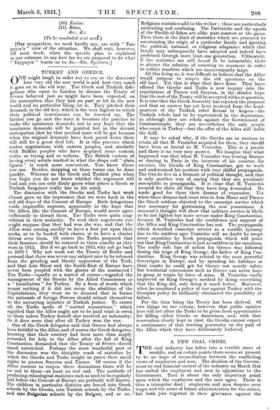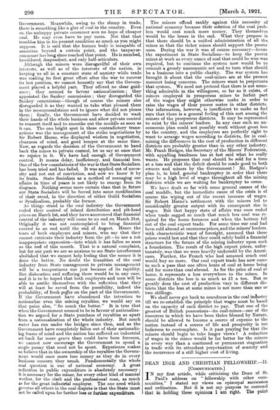A NEW COAL CRISIS. T HE coal industry has fallen into
a terrible state of muddle, and on certain points there seems at present to be no hope of reconciliation between the conflicting views of employers and men. The decision of the Govern- ment to end financial control of the industry on March 31st has united the employers and men in opposition to the Government. That is about the only important point upon which the employers and the men agree. There is thus a triangular duel ; employers and men dispute over wages and the areas of future administration for the mines, but both join together in their grievance against the Government. Meanwhile, owing to the slump in trade, there is something like a glut of coal in the country. Even so, the unhappy private consumer sees no hope of cheaper coal. He may even have to pay more. Not that that troubles him in his present condition as much as you might suppose. It is said that the human body is incapable of sensation beyond a certain point, and the taxpayer- consumer has long since reached that point. He is numbed, bewildered, despondent, and only half-articulate.
Although the miners were disregardful of their own interests, as well as of the interests of the nation, in keeping us all in a constant state of anxiety while trade was making its first great effort after the war to recover its lost position, We cannot honestly say that the Govern- ment played a helpful part. They offered no dear guid- ance ; they seemed to favour nationalization ; they appointed the Sankey commission ; they disregarded the Sankey commission—though of course the miners also disregarded it as they wanted to take what pleased them in the recommendations and to ignore what did not please them ; finally, the Government have decided to wash their hands of the whole business and allow private control to reassert itself and to smoothe out the muddle as soon as it can. The one bright spot in these contradictory trans- actions was the management of the strike negotiations by Sir Robert Horne, who displayed wisdom in negotiation, clearness of mind, and good temper at the same time. Now, as regards the decision of the Government to hand back the mines to private control, let us say at once that we rejoice in it. We have had enough of Government control. It means delay, inefficiency, and financial loss. One of the few consolations'of the war is that State Socialism has been tried and has failed. It was applied out of neces- sity and not out of conviction, and now we know it by its fruits. State Socialism as a method of managing our affairs in time of peace is not likely to emerge from its disgrace. Nothing seems more certain than that in future our State Socialists will be forced into some modification of their ereed, in the direction of either Guild Socialism or Syndicalism, probably the former.
As things stand in the coal industry the -Government ended their control of inland distribution and pit-head prices on March lit, and they have announced that financial control of the industry will come to an end on March 31st. Originally it was not contemplated to bring financial control to an end until the end of August. Hence the tears of both employers and miners, who say that they cannot extricate their industry from the pit—to use a not inappropriate expression—into which it has fallen so soon as the end of this month. That is a natural complaint, but for our part we are so anxious to see State interference abolished that we cannot help feeling that the sooner it is done the better. No doubt the transition of the coal industry from State management to private management will be a tempestuous one just because of its rapidity. But dislocation and suffering there would be in any case, and it is to be hoped that both employers and mon will be able to soothe themselves with the reflection that they will at least be saved from the possibility, indeed the probability, of fresh gaffes on the part of the Government. If the Government have abandoned the intention to nationalize even the raining royalties, we would My on that point also, " So much the better." It is true that when the Government seemed to be in favour of nationaliza- tion we argued for a State purchase of royalties as apart from a nationalization of the whole industry. But much water has run under the bridges since then, and as the Government have completely fallen out of their nationaliz- ing frame of mind and the nation has suffered an industrial set-back far more grave than could have been foreseen, we cannot now encourage the Government to spend a single penny that need not be spent. Experience makes us believe that in the ownership of the royalties the Govern- ment would once more lose money as they do in every business concern they touch. Fundamentally the whole coal question is one of national economy. A great reduction in public expenditure is absolutely necessary ; it is necessary for the miner, for every other kind of manual worker, for the clerk and the professional man, as much as for the great industrial employer. The one need which governs all others in the coal dispute is that the State must sot be called upon for further loss or further expenditure. The miners offend rankly against this necessity of national economy because their eolttion of the coal prob- lem would cost much more money. They themselves would be the losers in the end. What they propose is that there should be a unified administration of all the mines so that the richer mines should support the poorer ones. During the war it was of course necessary—hence the experiment in State Socialism—to keep the poorer mines at work as every ounce of coal that could be won was required, but to continue the system now would be to commit a grossly uneconomic act and to turn what should be a business into a public charity. The war system has brought it about that the coal-mines are at the present moment losing concerns. The miners want to perpetuate that system. We need not pretend that there is not some- thing admirable in the willingness, so far as it exists, of miners employed in prosperous mines to forfeit part of the wages they might otherwise make in order to raise the wages of their poorer mates in other -districts. Our information, however, is insufficient to make us feel sure that there is a general feeling of this sort among the miners of the prosperous districts. It may be represented to exist by the miners' leaders. In any case such an un- economic plan could not possibly work without great loss to the country, and the employers are perfectly right to want to arrange wages according to districts, for in coal- mining the differences in the cost of production in different districts are probably greater than in any other industry. Mr. Frank Hodges, the Secretary of the Miners' Federation, with appalling frankness has at last said what he really wants. He proposes that coal should be sold for a time at a loss and that the deficit should be made good to both owners and miners by the Government ! Mr. Hodges's plan is, in brief, 'general bankruptcy in •order that there may be a high level of wages throughout all the mining districts while we are waiting for bankruptcy to come.
We have dealt so far with some general causes of the coal muddle, but the immediate cause of the crisis is of course the wiping out of the recent increase of wages. Sir Robert Horne's settlement with the miners led to considerably greater output with its consequent rise in wages. But that happy state of affairs was soon ended when trade sagged so much that much less coal was re- quired for the home furnaces and when the bottom fell out of the coal export trade. Por some time our coal had been sold abroad at enormous prices, and the miners' leaders, with characteristic want of foresight, assumed that 'these prices would last and that they could safely build a financial structure for the 'future of the mining industry upon such a foundation. The result of the high export prices, unfor- tunately, was that we were heavily undersold by the Ameri- cans. Further, the French who had amassed much coal would buy no more. Our coal export trade has now come to such a pass that one often hears of coal at home being sold for more than coal abroad. As for the price of coal at home, it represents a loss everywhere to the mines. In some districts the loss is as much as £1 a ton. But so greatly 'does the cost of production vary in different dis- tricts that the loss at some mines is not more than one or two shillings. We shall never get back to soundness-in the coal industry till we re-establish the principle that wages must be based on the capacity of each district to pay. That one of the greatest of British possessions—its coal-mines—one of the resources in which we have been thrice blessed by Nature, should be allowed to become a source of expense to the nation instead of a source of life and prosperity is too ludicrous to contemplate. Is it past praying 'for that the miners should begin to take longer views ? A reduction of wages in the mines would be far better for the miners in every way than a continued or permanent stagnation in trade with its attendant perpetuation of scarcity and the recurrence of a still higher cost of living.



































 Previous page
Previous page